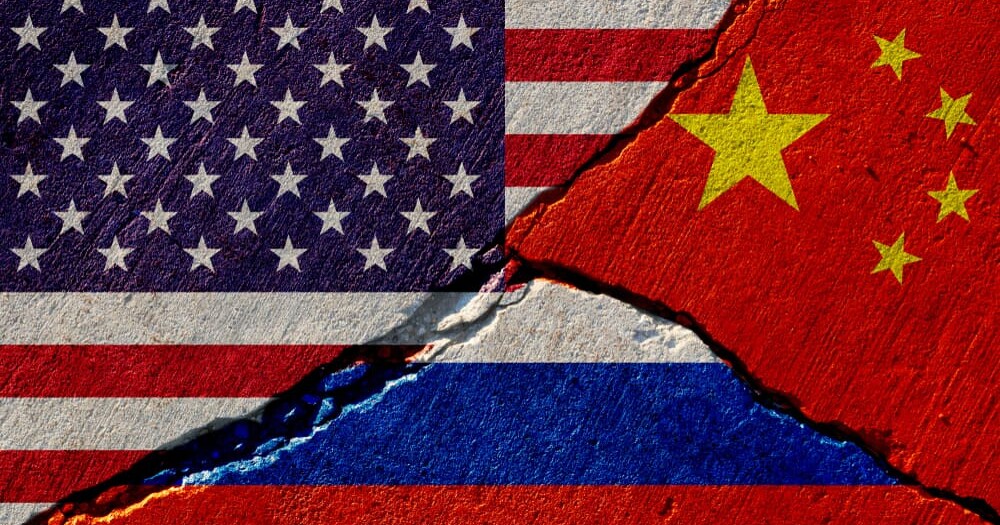In the early 1970s, China was supplying significant military, financial, and logistical assistance to North Vietnam in its war against the United States. China was helping North Vietnamese troops kill American soldiers. Domestically, China was still in the throes of the Cultural Revolution, Mao Zedong’s chaotic, bloody purge that killed more than two million people in revolutionary episodes of “unfathomable brutality.” Yet, President Richard Nixon was determined to improve relations with China while simultaneously pursuing détente with the Soviet Union in what scholars have called “triangular diplomacy.” President Donald Trump is doing a “reverse Nixon manoeuvre,” writes the renowned strategic thinker Edward Luttwak, in his geopolitical embrace of Vladimir Putin’s Russia.
Luttwak has been a consultant to the Pentagon and the Israeli Army, and is the author of Strategy: The Logic of War and Peace, The Grand Strategy of the Roman Empire, The Grand Strategy of the Byzantine Empire, The Grand Strategy of the Soviet Union, and The Rise of China vs. the Logic of Strategy. He understands global politics more than most contemporary commentators and does not suffer fools gladly. Trump’s “refusal to subordinate everything to Ukraine’s needs and ambitions,” Luttwak writes, means that “it is China and not Russia that is the White House’s main concern these days.” (RELATED: Is US Support for Ukraine Over?)
That was evident in Trump’s first term, Luttwak explains, when he strengthened technology export controls against China — a policy that even the Biden administration continued. Josh Rogin has written about the rise of the China hawks in the last two years of Trump’s first term, and it was Defense official Elbridge Colby who largely authored the 2018 National Defense Strategy that shifted the nation’s national security focus from peripheral wars to great power rivalries. Trump has nominated Colby to serve as under secretary of defense for policy in his second administration. Colby is on record stating that U.S. involvement in Ukraine is needlessly draining limited military resources that would be better used in the Indo-Pacific. (RELATED: NATO Firsters vs. Elbridge Colby)
Luttwak notes that China is more assertive and aggressive than it was during Trump’s first term — an unhappy legacy of Biden’s presidency. Trump’s Russia gambit, he believes, is designed to peel away Russia from China and thereby establish a Eurasian balance of power that favors the United States. In Luttwak’s words, “Russia’s immense territory interposed between China and the West, both in Europe and North America, would function in war as the Pacific Ocean serves the U.S., from San Diego and Pearl Harbor to Taiwan and China.” (RELATED: China’s Threat to Taiwan: Intentions and Capabilities)
Vladimir Putin is not helping to kill U.S. soldiers as Mao Zedong did in the early 1970s. Putin’s human rights violations — and they are many — pale in comparison to Mao’s murderous regime. If Nixon could work with Mao to help balance against Soviet power, Trump can work with Putin to lessen China’s global threat. (RELATED: Liberals Supported Deals With Communists but Not With Putin)
Despite all the talk of the Sino–Russian strategic partnership, Luttwak senses Russian concerns about Chinese infiltration of Russia’s maritime province in eastern Siberia. This huge region, Luttwak notes, is populated by eight million Russians who share a border with more than 60 million Chinese. Meanwhile, China’s desire to end its “century of humiliation” includes righting the wrongs inflicted by Russia, which extorted huge territorial concessions from China in the mid-19th century.
Trump’s goal is to make Russia less dependent on China than it is now. Anything — including a negotiated peace in Ukraine that concedes certain territories to Russia and leaves Ukraine outside of NATO — that separates Russia from China improves America’s global position. The more politically divided the Eurasian landmass is, the more secure the United States will be. That’s geopolitics 101, and Luttwak gets it. So, too, does Trump.
READ MORE from Francis P. Sempa:
National Review Sides With the War Party Again
























